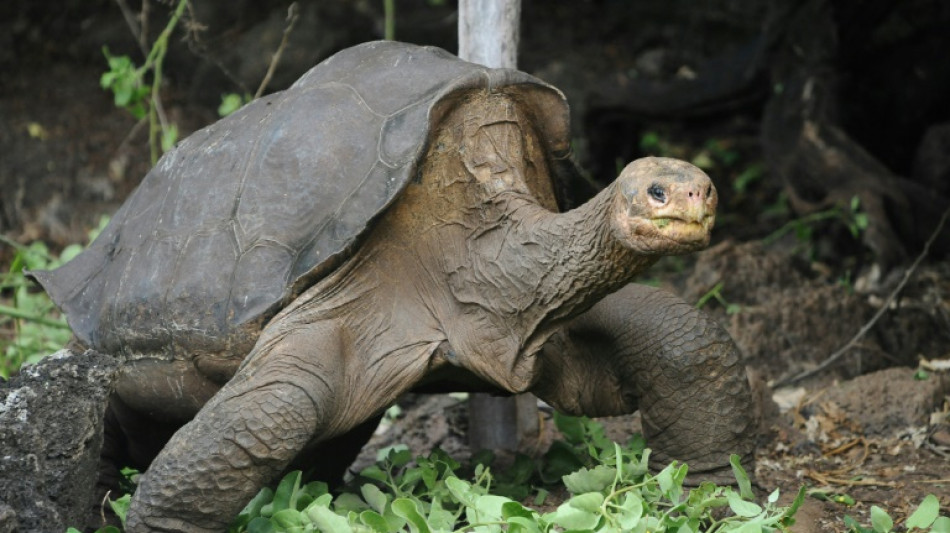
-
 Blanc wins final women's race before Winter Olympics
Blanc wins final women's race before Winter Olympics
-
Elena Rybakina: Kazakhstan's Moscow-born Melbourne champion

-
 Ice-cool Rybakina beats Sabalenka in tense Australian Open final
Ice-cool Rybakina beats Sabalenka in tense Australian Open final
-
Pakistan attacks kill 15, dozens of militants dead: official

-
 Ten security officials, 37 militants killed in SW Pakistan attacks: official
Ten security officials, 37 militants killed in SW Pakistan attacks: official
-
Epstein survivors say abusers 'remain hidden' after latest files release

-
 'Full respect' for Djokovic but Nadal tips Alcaraz for Melbourne title
'Full respect' for Djokovic but Nadal tips Alcaraz for Melbourne title
-
Wollaston goes back-to-back in the Cadel Evans road race

-
 Women in ties return as feminism faces pushback
Women in ties return as feminism faces pushback
-
Ship ahoy! Prague's homeless find safe haven on river boat

-
 Britain's Starmer ends China trip aimed at reset despite Trump warning
Britain's Starmer ends China trip aimed at reset despite Trump warning
-
Carlos Alcaraz: rare tennis talent with shades of Federer

-
 Novak Djokovic: divisive tennis great on brink of history
Novak Djokovic: divisive tennis great on brink of history
-
History beckons for Djokovic and Alcaraz in Australian Open final

-
 Harrison, Skupski win Australian Open men's doubles title
Harrison, Skupski win Australian Open men's doubles title
-
Epstein offered ex-prince Andrew meeting with Russian woman: files

-
 Jokic scores 31 to propel Nuggets over Clippers in injury return
Jokic scores 31 to propel Nuggets over Clippers in injury return
-
Montreal studio rises from dark basement office to 'Stranger Things'

-
 US government shuts down but quick resolution expected
US government shuts down but quick resolution expected
-
Mertens and Zhang win Australian Open women's doubles title

-
 Venezuelan interim president announces mass amnesty push
Venezuelan interim president announces mass amnesty push
-
China factory activity loses steam in January

-
 Melania Trump's atypical, divisive doc opens in theatres
Melania Trump's atypical, divisive doc opens in theatres
-
Bad Bunny set for historic one-two punch at Grammys, Super Bowl

-
 Five things to watch for on Grammys night Sunday
Five things to watch for on Grammys night Sunday
-
Venezuelan interim president proposes mass amnesty law

-
 Rose stretches lead at Torrey Pines as Koepka makes cut
Rose stretches lead at Torrey Pines as Koepka makes cut
-
Online foes Trump, Petro set for White House face-to-face

-
 Seattle Seahawks deny plans for post-Super Bowl sale
Seattle Seahawks deny plans for post-Super Bowl sale
-
US Senate passes deal expected to shorten shutdown

-
 'Misrepresent reality': AI-altered shooting image surfaces in US Senate
'Misrepresent reality': AI-altered shooting image surfaces in US Senate
-
Thousands rally in Minneapolis as immigration anger boils

-
 US judge blocks death penalty for alleged health CEO killer Mangione
US judge blocks death penalty for alleged health CEO killer Mangione
-
Lens win to reclaim top spot in Ligue 1 from PSG

-
 Gold, silver prices tumble as investors soothed by Trump Fed pick
Gold, silver prices tumble as investors soothed by Trump Fed pick
-
Ko, Woad share lead at LPGA season opener

-
 US Senate votes on funding deal - but shutdown still imminent
US Senate votes on funding deal - but shutdown still imminent
-
US charges prominent journalist after Minneapolis protest coverage

-
 Trump expects Iran to seek deal to avoid US strikes
Trump expects Iran to seek deal to avoid US strikes
-
Guterres warns UN risks 'imminent financial collapse'

-
 NASA delays Moon mission over frigid weather
NASA delays Moon mission over frigid weather
-
First competitors settle into Milan's Olympic village

-
 Fela Kuti: first African to get Grammys Lifetime Achievement Award
Fela Kuti: first African to get Grammys Lifetime Achievement Award
-
'Schitt's Creek' star Catherine O'Hara dead at 71

-
 Curran hat-trick seals 11 run DLS win for England over Sri Lanka
Curran hat-trick seals 11 run DLS win for England over Sri Lanka
-
Cubans queue for fuel as Trump issues energy ultimatum

-
 France rescues over 6,000 UK-bound Channel migrants in 2025
France rescues over 6,000 UK-bound Channel migrants in 2025
-
Surprise appointment Riera named Frankfurt coach

-
 Maersk to take over Panama Canal port operations from HK firm
Maersk to take over Panama Canal port operations from HK firm
-
US arrests prominent journalist after Minneapolis protest coverage


Extinct-in-the-wild species in conservation limbo
For species classified as "extinct in the wild", the zoos and botanical gardens where their fates hang by a thread are as often anterooms to oblivion as gateways to recovery, new research has shown.
Re-wilding what are often single-digit populations faces the same challenges that pushed these species to the cusp of extinction in the first place, including a lack of genetic diversity. But without conservation efforts, experts say, chances of these species surviving would be even smaller.
Since 1950, nearly 100 animal and plant species vanquished from nature by hunting, pollution, deforestation, invasive lifeforms and other drivers of extinction have been put into critical care by scientists and conservationists, according to the findings.
While the category "extinct in the wild" was not added to the benchmark Red List of Threatened Species until 1994, the term could have applied to all of them.
Of these species teetering on the edge, 12 have been reintroduced to some degree back into the wild, according to a pair of studies published last week in the journals Science and Diversity.
Another 11, however, have gone the way of dinos, dodos and dozens of Pacific island trees, whose delicate flowers will never again grace the planet.
Biodiversity loss has reached crisis proportions not seen since an errant asteroid as big across as Paris smashed into Earth 66 million years ago, wiping out land dinosaurs and ending the Cretaceous period.
That was one of five so-called mass extinction events over the last half-billion years.
Scientists say human activity has pushed Earth into the sixth, with species disappearing 100 to 1,000 times more quickly than normal.
"Real opportunities to prevent extinction and return previously lost species to the wild abound and we must take them," the international team of 15 authors said.
"We have lost 11 species entirely under our care to extinction since 1950."
- Success stories -
Another study published last week in Current Biology -- looking at the "Great Dying" event 252 million years ago that annihilated 95 percent of life on Earth -- showed that accelerated species loss preceded broader ecological collapse.
"Currently, we may be losing species at a faster rate than in any of Earth's past extinctions," lead author Yuangeng Huang, a researcher at the China University of Geosciences, told AFP.
"We cannot predict the tipping point that will send ecosystems into a total collapse but it is an inevitable outcome if we do not reverse biodiversity loss."
Recent conservation success stories -- some of them heroic -- include the European bison, which once roamed across Europe.
By the 1920s their numbers were so reduced that surviving specimens were rounded up into zoos and a breeding programme was launched in Poland.
After reintroduction into the wild in 1952, the broad-shouldered beasts thrived and are no longer considered threatened with extinction by the Internation Union for the Conservation of Nature (IUCN), the keepers of the Red List.
Red wolves in North America, wild horses in central Asia and the desert-dwelling Arabian oryx have all staged comebacks with a helping human hand.
So has the largest land tortoise in the world, native to Espanola Island in the Galapagos.
By the 1970s, Chelonoidis hoodensis had been eaten to the brink. Fourteen surviving individuals were removed and relocated decades later to another island, where their numbers are increasing.
- 'Overlooked category' -
Giant Pinta tortoises on a neighbouring Galapagos island -- one of the 11 extinct-in-the-wild species that didn't make it -- were not so lucky.
After living for half a century as his species' sole survivor, a 75-kilogramme (165-pound) male known as Lonesome George died in 2012.
Other creatures that never made it out of intensive care include Hawaii's black-faced honey creeper, a petite bird devastated by mosquito-borne avian malaria last seen in 2004; Mexico's freshwater Catarina pupfish, unsuccessfully relocated to captivity when its native habitat dried out due to groundwater extraction; and five types of snail on the Society Islands that fell victim to an invasive carnivorous cousin.
Surprisingly, the studies show that species surviving only in controlled environments are in a kind of conservation limbo.
"This is an overlooked category," the researchers noted.
"Despite being considered most at risk, extinct-in-the-wild species are not assessed under the Red List process."
"We have largely ignored the extent of, and the variation in, extinction risk of the very group of species for which humans are most responsible," they added.
Of the 84 species currently with this status, nearly half have not benefitted from attempts to reintroduce them into the wild. Most are plants, suggesting a possible bias towards reintroducing animals that might not be entirely scientifically justified.
At its most recent World Conservation Congress in 2020, the IUCN called for the reestablishment of extinct-in-the-wild species in the wild by 2030.
Y.Bouchard--BTB



